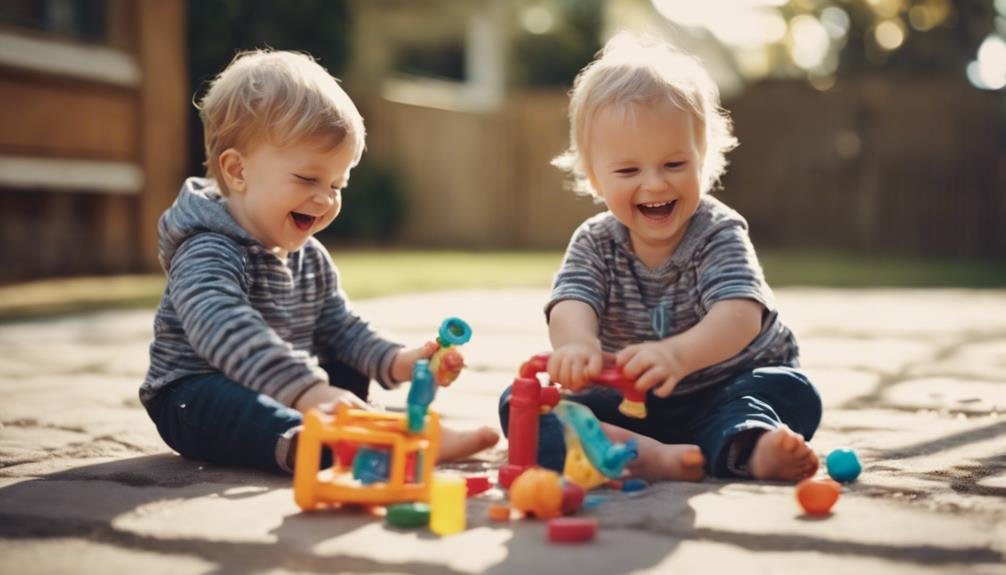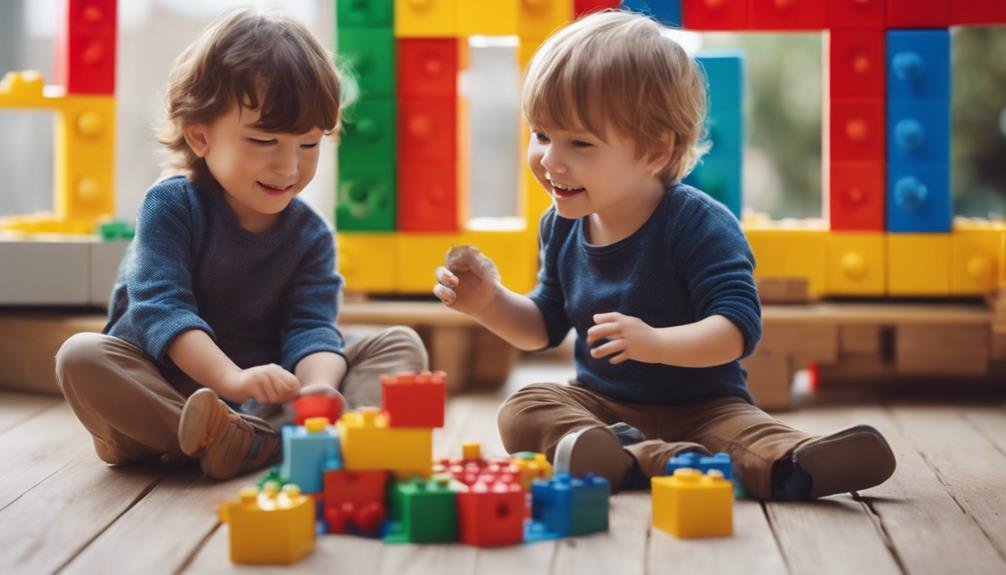"Cherishing Little Steps - A Haven for Baby and Family Journeys"
Social Skills for Toddlers: Fostering Early Friendships and Cooperation
As a parent, you understand the importance of nurturing your toddler's social skills, but how can you effectively guide them towards forming early friendships and fostering cooperation with their peers? It's not just about playdates and sharing toys; there's a deeper level of understanding and skill development required to navigate the complexities of social interactions at such a young age. By incorporating strategies that go beyond the surface level, you can equip your child with the necessary tools to thrive in social settings and build lasting connections.
Key Takeaways
- Encourage playdates for social interaction.
- Model empathy and sharing behaviors.
- Teach communication and problem-solving skills.
- Engage in group activities to promote cooperation.
- Create a nurturing environment for learning social skills.
Importance of Social Skills Development

Developing social skills in toddlers is crucial for their overall growth and success in interacting with others. As a parent or caregiver, you play a vital role in nurturing these skills from a young age. Social skills encompass a range of abilities, including communication, empathy, sharing, and cooperation. By encouraging positive social interactions, you help your toddler build confidence and form meaningful relationships.
Toddlers learn through observation and imitation, making it essential to model appropriate social behaviors in your interactions with them and others. Simple actions like greeting others with a smile, using polite words, and taking turns can have a significant impact on your child's social development. Encouraging them to engage in play with peers and offering guidance on resolving conflicts peacefully can also foster important social skills.
Setting Positive Examples at Home
To instill positive social behaviors in toddlers, create a nurturing environment at home where they can observe and learn from your interactions with others. Your actions and words serve as powerful examples for your little ones, shaping their understanding of how to engage with the world around them.
Here are some ways you can set positive examples at home:
- Practice Kindness: Show kindness to family members, neighbors, and even strangers to demonstrate the importance of empathy and compassion.
- Resolve Conflicts Peacefully: Model healthy conflict resolution by calmly discussing issues and finding solutions together.
- Demonstrate Good Manners: Use 'please' and 'thank you' regularly, teaching toddlers the value of politeness and respect.
- Share and Take Turns: Encourage sharing toys and taking turns during family activities to promote cooperation and consideration for others.
Encouraging Playdates and Group Activities

Encouraging playdates and group activities can provide valuable social experiences for toddlers, allowing them to interact with peers and practice important social skills in a fun and engaging setting. These interactions help them learn how to share, take turns, communicate effectively, and develop empathy towards others. To help you understand the benefits of playdates and group activities, here is a table highlighting some key advantages:
| Benefits of Playdates and Group Activities |
|---|
| 1. Opportunity to practice sharing skills |
| 2. Enhances communication abilities |
| 3. Builds empathy towards peers |
| 4. Encourages cooperative play |
| 5. Fosters a sense of belonging |
Teaching Empathy and Sharing
Teach toddlers the importance of understanding and caring for the feelings of others through simple daily interactions and activities. Empathy and sharing are crucial social skills that can positively impact your child's relationships and overall well-being.
Here are some practical ways to nurture these qualities in your toddler:
- Model Empathy: Show empathy towards your child and others in your interactions.
- Encourage Turn-Taking: Teach your toddler to take turns while playing with others.
- Praise Sharing: Acknowledge and praise your child when they share toys or snacks with others.
- Read Books About Feelings: Use storytime to introduce emotions and discuss how characters might be feeling.
Practicing Communication and Problem-Solving

Help your toddler practice effective communication and problem-solving skills by engaging in interactive activities that promote healthy dialogue and critical thinking. Encourage your child to express their thoughts and feelings openly, and actively listen to what they've to say. This fosters a sense of trust and understanding, laying a strong foundation for future relationships. When conflicts arise, guide your toddler in brainstorming solutions together. Teach them to consider the perspectives of others and work towards a resolution that's fair for everyone involved.
Use everyday situations as learning opportunities. For example, when deciding what game to play, encourage your toddler to communicate their preferences and listen to their playmate's choices. This helps them practice negotiation and compromise. Additionally, engage in activities that require teamwork, like building a puzzle or playing a cooperative game. This not only enhances their problem-solving skills but also teaches them the value of collaboration. By consistently practicing these skills, your toddler will develop strong communication abilities and effective problem-solving techniques that will benefit them throughout their lives.
Promoting Cooperation and Teamwork
To further enhance your toddler's social skills, guide them in engaging in activities that foster cooperation and teamwork with their peers. Working together with others is a valuable skill that can benefit your child in various aspects of their life. Here are some ways you can promote cooperation and teamwork in your toddler:
- Encourage Sharing: Teach your toddler the importance of sharing toys and taking turns with their friends. This helps them understand the concept of cooperation and builds their social skills.
- Group Play: Organize playdates or group activities where children need to work together towards a common goal. This can be as simple as building a block tower together.
- Praise Team Efforts: Acknowledge and praise your toddler when they cooperate with others or work as a team. Positive reinforcement encourages them to continue these behaviors.
- Model Collaboration: Be a role model for your child by demonstrating teamwork and cooperation in your interactions with them and others. Children learn best through observation, so show them how it's done.
Frequently Asked Questions
How Can I Help My Toddler Deal With Rejection From Their Peers?
When your toddler faces rejection from peers, offer comfort and understanding. Validate their feelings, encourage resilience, and model positive ways to handle disappointment. Teach them that it's okay to feel hurt but also to move forward.
What Are Some Strategies to Teach Toddlers to Navigate Conflicts Independently?
When conflicts arise, guide your toddler to express feelings calmly, listen actively, and brainstorm solutions together. Encourage them to take turns speaking and find compromises. By teaching these skills early, you empower them to navigate conflicts independently.
Should I Intervene When My Toddler Is Not Sharing With Others?
When your toddler is not sharing, gently guide them to take turns and explain the importance of sharing. Intervene with patience and model sharing behaviors. Encouraging empathy and cooperation now can lay a strong foundation for positive social interactions in the future.
How Can I Encourage My Shy Toddler to Participate in Group Activities?
When your shy toddler hesitates in group activities, gently guide them by showing interest in what they like, modeling participation, and praising their efforts. Create a safe environment for exploration, helping them gain confidence slowly.
What Role Do Cultural Differences Play in Social Skills Development for Toddlers?
Understanding cultural differences in social skills development for toddlers is crucial. Encourage exposure to diverse environments, celebrate various customs, and teach empathy. Embrace the richness of cultural diversity, fostering a more inclusive and understanding approach.
Conclusion
In the journey of fostering social skills for toddlers, remember: building friendships and cooperation is like planting seeds in a garden.
By nurturing positive interactions, teaching empathy, and encouraging teamwork, you're laying the foundation for a flourishing social future.
Keep watering these seeds with love and guidance, and watch as beautiful friendships bloom and grow.
Your efforts today will shape the friendships and connections that will enrich your child's life for years to come. Keep nurturing those social skills!



Hello there, just became alert to your blog through
Google, and found that it is truly informative. I’m gonna watch out for brussels.
I will appreciate if you continue this in future.
A lot of people will be benefited from your writing. Cheers!
Lista escape roomów
Really fantastic info can be found on web site.!
Excellent post. I will be experiencing a few of these issues as well..
You are so cool! I do not think I’ve read something like this before. So great to discover another person with some genuine thoughts on this subject matter. Seriously.. thanks for starting this up. This web site is something that is needed on the internet, someone with a bit of originality.
I like it when folks get together and share views. Great site, stick with it!
Hello there, I do think your web site might be having browser compatibility issues. When I look at your web site in Safari, it looks fine however, when opening in IE, it’s got some overlapping issues. I merely wanted to give you a quick heads up! Besides that, wonderful website.
There is certainly a great deal to learn about this topic. I really like all the points you’ve made.
Very good article. I certainly appreciate this website. Stick with it!
Greetings! Very helpful advice within this post! It’s the little changes which will make the most important changes. Thanks for sharing!
Pretty! This was an incredibly wonderful post. Many thanks for providing these details.
I used to be able to find good advice from your blog posts.
Spot on with this write-up, I honestly feel this site needs far more attention. I’ll probably be back again to see more, thanks for the information.
A motivating discussion is definitely worth comment. I think that you need to write more about this subject matter, it may not be a taboo subject but typically people do not discuss these topics. To the next! Kind regards!
You need to be a part of a contest for one of the most useful websites online. I most certainly will recommend this web site!
Everything is very open with a clear description of the challenges. It was really informative. Your website is extremely helpful. Thank you for sharing!